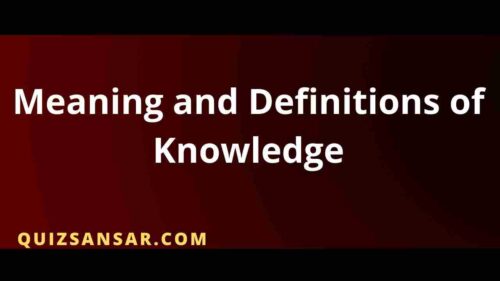
Meaning and Definitions of Knowledge

Meaning and Definitions of Knowledge
The intellectual experience through the senses is called knowledge. To attain knowledge, it is absolutely necessary to have intellect. Therefore, it is clear that knowledge is to become familiar with any fact, element or thing through direct experience, practical skill and information. Man is the only conscious being on earth, who is capable of thinking, contemplating, churning and gaining experience, on the basis of which he becomes aware of new facts and elements and acquires knowledge. There are two main aspects in the generation of knowledge the knower and the known. When a man becomes acquainted with things and ideas i.e. known things, then knowledge arises; When a person accepts an object or idea on the basis of perception, belief, reasoning and experience, then only knowledge is created, by continuing this sequence, knowledge increases. And every day new achievements are made in various fields of knowledge and along with that knowledge is expanded. There is continuous development of knowledge. On the basis of new ideas, facts and information, the cycle of practical research continues, new subject areas arise which are very helpful in the generation of knowledge.
The concept, scope and nature of knowledge is quite wide. Therefore, it cannot be confined within any definition. The world of knowledge is infinite and its development is exponential, so it is not impossible to tell its perimeter, but it is definitely complicated. The following are the definitions of knowledge given by some scholars-
In the words of S.R. Ranganathan- “Knowledge is the sum total of civilization preserved information”.
According to Webster’s New International Dictionary of the English Language-“Knowledge is the information acquired through actual experience, practical experience, skill, etc.”
In the words of J.S. Shera- “Knowledge is the result of a process performed by the intellectual method”.
In the words of Plato, “Knowledge is eternal. By this essential characteristic of his attitude towards truth, it is possible for him to distinguish between knowledge and ignorance, truth and conjecture in terms of his active intelligence, sense experience, the original experience and his consciousness.
In the words of Russell- “The brain does not create true or false perceptions. The mind builds trust. When the facts related to the belief are obtained, then the belief turns into truth and if the relevant facts are not received, the belief becomes false. Therefore, it can be said that knowledge is a belief based on truth.
From the study of the above definitions of knowledge it is concluded that “that definite information or set of ideas which man acquires and preserves so that it can be continuously passed on to other seekers, is called knowledge”.
IMPORTANT LINK
- Principles of Health Education
- Useful methods of Providing Health Education in School
- What is Ozone ? | Causes of Ozone Layer Corrosion | Side Effects
- Meaning of Biodiversity | Types of Biodiversity | Conservation of Biodiversity | Importance of Biodiversity
- Role of functional Research in Solving Environmental Problems
- Meaning of Functional Research | Importance of Functional Research in Environmental Education | The Goal of Functional Research
- School and Environmental Protection
- Role of the School in Environmental Protection and Sustainable Development
- Meaning of Green House Effect | Major Sources of Greenhouse Gases
- Consequences of Increase in Greenhouse Gases | Measures to avoid the greenhouse effect
- Upper Primary Level Curriculum
- Aptitude and Environmental Education | Program-Related to Aptitude Development in Students towards Environment
- What are the causes of the environmental outbreak?
